

The Life of the Mind: Hannah Arendt on Thinking vs. Knowing and the Crucial Difference Between Truth and Meaning. By Maria Popova “To lose the appetite for meaning we call thinking and cease to ask unanswerable questions [would be to] lose not only the ability to produce those thought-things that we call works of art but also the capacity to ask all the answerable questions upon which every civilization is founded.”

The Life of the Mind - Hannah Arendt. Hannah Arendt. Life and career[edit] Arendt was born into a secular family of German Jews in Linden (present-day Hanover), the daughter of Martha (born Cohn) and Paul Arendt.[7] She grew up in Königsberg (renamed Kaliningrad and annexed to the Soviet Union in 1946) and Berlin.

At the University of Marburg, she studied philosophy with Martin Heidegger. According to Hans Jonas, her only German-Jewish classmate, Arendt embarked on a long and stormy romantic relationship with Heidegger, for which she later was criticized because of Heidegger's support for the Nazi Party when he was rector at the University of Freiburg. In the wake of one of their breakups, Arendt moved to Heidelberg, where she wrote her dissertation under the existentialist philosopher-psychologist Karl Jaspers on the concept of love in the thought of Saint Augustine. In 1929, in Berlin, she married Günther Stern, later known as Günther Anders.
Paris[edit] Suffering is Caused by Ignorance. As many of my readers already know, I was blessed to be able to attend the Kalachakra Initiation, in Washington D.C., this past July.
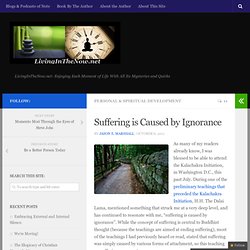
During one of the preliminary teachings that preceded the Kalachakra Initiation, H.H. The Dalai Lama, mentioned something that struck me at a very deep level, and has continued to resonate with me, “suffering is caused by ignorance”. While the concept of suffering is central to Buddhist thought (because the teachings are aimed at ending suffering), most of the teachings I had previously heard or read, stated that suffering was simply caused by various forms of attachment, so this teaching on suffering was new to me.
For my non-Buddhist readers, I should probably explain the concept of suffering in Buddhist philosophy. Think: The Life of the Mind and the Love of God (trailer) Wp-content/uploads/2012/01/tumblr_l48etwfPNQ1qb75pro1_5001.jpg. Origins of Psychology. While the psychology of today reflects the discipline’s rich and varied history, the origins of psychology differ significantly from contemporary conceptions of the field.
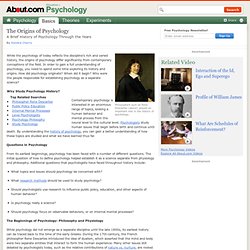
In order to gain a full understanding of psychology, you need to spend some time exploring its history and origins. How did psychology originate? When did it begin? Who were the people responsible for establishing psychology as a separate science? Why Study Psychology History? Evolutionary psychology. Evolutionary psychology (EP) is an approach in the social and natural sciences that examines psychological traits such as memory, perception, and language from a modern evolutionary perspective.
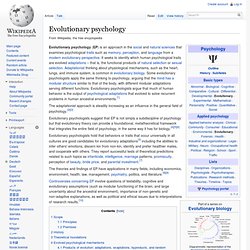
It seeks to identify which human psychological traits are evolved adaptations – that is, the functional products of natural selection or sexual selection. Adaptationist thinking about physiological mechanisms, such as the heart, lungs, and immune system, is common in evolutionary biology. Some evolutionary psychologists apply the same thinking to psychology, arguing that the mind has a modular structure similar to that of the body, with different modular adaptations serving different functions. Brain Evolution: The Accidental Mind (I) B. F. Skinner, Behaviorism and Your Superstitious Beliefs. The Big Bang Theory - Sheldon Trains Penny. South Park: Dog Whisperer. The Century of the Self. The Century of the Self is a British television documentary series by Adam Curtis, released in 2002.

It focuses on how the work of Sigmund Freud, Anna Freud, and Edward Bernays influenced the way corporations and governments have analyzed, dealt with, and controlled people.[1] Episodes[edit] Happiness Machines (17 March 2002)The Engineering of Consent (24 March 2002)There is a Policeman Inside All Our Heads: He Must Be Destroyed (31 March 2002)Eight People Sipping Wine in Kettering (7 April 2002) Overview[edit] "This series is about how those in power have used Freud's theories to try and control the dangerous crowd in an age of mass democracy.
" Behaviorism. First published Fri May 26, 2000; substantive revision Tue Jul 27, 2010 It has sometimes been said that “behave is what organisms do.”
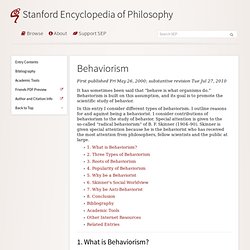
Behaviorism is built on this assumption, and its goal is to promote the scientific study of behavior. In this entry I consider different types of behaviorism. I outline reasons for and against being a behaviorist. Origins of Psychology. Criminal psychology. Criminal psychology is the study of the wills, thoughts, intentions and reactions of criminals, all that partakes in the criminal behavior.[1][2] It is related to the field of criminal anthropology.
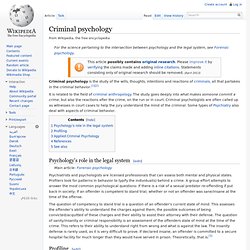
The study goes deeply into what makes someone commit a crime, but also the reactions after the crime, on the run or in court. Mental health. Mental health (or behavioral health) is a level of psychological well-being, or an absence of a mental disorder.[1][2] From the perspective of 'positive psychology' or 'holism', mental health may include an individual's ability to enjoy life, and create a balance between life activities and efforts to achieve psychological resilience.[1] Mental health can also be defined as an expression of emotions, and as signifying a successful adaptation to a range of demands.
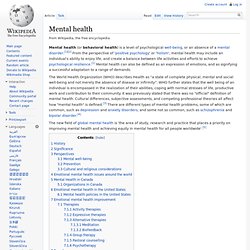
The World Health Organization (WHO) describes Health as “a state of complete physical, mental and social well-being and not merely the absence of disease or infirmity”. WHO further states that the well being of an individual is encompassed in the realization of their abilities, coping with normal stresses of life, productive work and contribution to their community. It was previously stated that there was no "official" definition of mental health. History[edit] Significance[edit] Mental disorder. Classifications The definition and classification of mental disorders is a key issue for researchers as well as service providers and those who may be diagnosed.
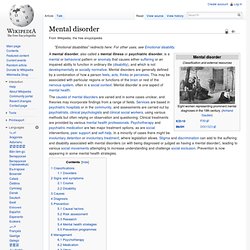
Most international clinical documents use the term mental "disorder", while "illness" is also common. It has been noted that using the term "mental" (i.e., of the mind) is not necessarily meant to imply separateness from brain or body. There are currently two widely established systems that classify mental disorders; Both these list categories of disorder and provide standardized criteria for diagnosis. The DSM and ICD approach remains under attack both because of the implied causality model[5] and because some researchers believe it better to aim at underlying brain differences which can precede symptoms by many years.[6][7] Disorders.
Psychiatry. Initial psychiatric assessment of a person typically begins with a case history and mental status examination. Psychological tests and physical examinations may be conducted, including on occasion the use of neuroimaging or other neurophysiological techniques. Mental disorders are broadly diagnosed in accordance with criteria listed in diagnostic manuals such as the widely used Diagnostic and Statistical Manual of Mental Disorders (DSM), published by the American Psychiatric Association, and the International Classification of Diseases (ICD), edited and used by the World Health Organization.
The fifth edition of the DSM (DSM-5) was published in 2013, and its development was expected to be of significant interest to many medical fields.[1] The combined treatment of psychiatric medication and psychotherapy has become the most common mode of psychiatric treatment in current practice,[2] but current practice also includes widely ranging variety of other modalities. Etymology[edit] no data. Mental status examination. The mental status examination or mental state examination, abbreviated MSE, is an important part of the clinical assessment process in psychiatric practice. It is a structured way of observing and describing a patient's current state of mind, under the domains of appearance, attitude, behavior, mood and affect, speech, thought process, thought content, perception, cognition, insight and judgment.[1] There are some minor variations in the subdivision of the MSE and the sequence and names of MSE domains.
The purpose of the MSE is to obtain a comprehensive cross-sectional description of the patient's mental state, which, when combined with the biographical and historical information of the psychiatric history, allows the clinician to make an accurate diagnosis and formulation, which are required for coherent treatment planning.
The MSE is not to be confused with the mini-mental state examination (MMSE), which is a brief neuro-psychological screening test for dementia. Application[edit] The Psychology of Philosophy. As an undergrad, my favorite philosophers were Nietzsche , Zhuangzi , and Paul Feyerabend -- all critics of High Reason, elegant rhetoricians against seeing philosophy (and science) as dispassionate intellection of the one truth. Why was I drawn to them -- to each of them from the first page, almost? Was it a nuanced appreciation of the arguments and counterarguments? Of course not. Rather, it was a psychological urge: Something in me rebelled against tyrant reason.
I wanted to see it get its comeuppance. My 1997 dissertation , I realized only in retrospect, had four parts each of which was a rebellion, too: The first part (on infant and animal belief) attacked the views of Donald Davidson , probably the most eminent philosopher at my graduate institution. My interests in philosophy have traced a crooked course, from Nietzsche and Unamuno to skepticism and philosophy of science, to developmental psychology, belief, consciousness, self-knowledge, and moral psychology.
Philosophy of psychology. Philosophy of psychology refers to issues at the theoretical foundations of modern psychology . Some of these issues are epistemological concerns about the methodology of psychological investigation. For example: What is the most appropriate methodology for psychology: mentalism , behaviorism , or a compromise? Are self-reports a reliable data-gathering method? What conclusions can be drawn from null hypothesis tests? Cornel West. Cornell West, activists arrested at Stop and Frisk protest i. Cornel West (CornelWest)
EXAMINED LIFE: Cornel West on TRUTH. René Descartes. Descartes laid the foundation for 17th-century continental rationalism, later advocated by Baruch Spinoza and Gottfried Leibniz, and opposed by the empiricist school of thought consisting of Hobbes, Locke, Berkeley, and Hume. Leibniz, Spinoza and Descartes were all well versed in mathematics as well as philosophy, and Descartes and Leibniz contributed greatly to science as well. His best known philosophical statement is "Cogito ergo sum" (French: Je pense, donc je suis; I think, therefore I am), found in part IV of Discourse on the Method (1637 – written in French but with inclusion of "Cogito ergo sum") and §7 of part I of Principles of Philosophy (1644 – written in Latin). Early life[edit] Descartes was born in La Haye en Touraine (now Descartes), Indre-et-Loire, France. When he was one year old, his mother Jeanne Brochard died.
In his book, Discourse On The Method, he says "I entirely abandoned the study of letters. Visions[edit] Work[edit] Critical Thinking Part 1: A Valuable Argument. Mckenna - How to Think and Understand Effectively. How to think like a philosopher. "Guiding Students as They Learn How to Think" The Socratic Method: What It is and How to Use It in the Classroom. The Splintered Mind: The Psychology of Philosophy. Dan Gilbert on the Myth of Objectivity. Brain Anatomy - The Anatomy of the Brain. Neuroscience. Professor Steven Rose 'Can Neuroscience Explain the Mind' Video: A Graphic Novel Explaining Neuroscience. This looks interesting — a video about the development of a graphic novel on neuroscience.
The Guardian, which produced the video that is embedded below (though I’m not sure if it’s viewable through an RSS Reader) makes it sound pretty interesting: Artist Matteo Farinella and neuroscientist Hana Ros of University College London collaborated to create a graphic novel called Neurocomic about a hapless character who is sucked into a human brain where he encounters bizarre creatures and famous neuroscientists. RSA Animate - The Divided Brain. RSA Shorts - Does Brainstorming Work? Documentaries on Neuroscience. Neuroscience and Free Will. The Neuroscience of Consciousness. Southampton Neuroscience Group.
Welcome to SoNG, the Southampton Neurosciences Group at the University of Southampton. This group was established in 2001 to provide a focus for collaborative, interdisciplinary and applied neuroscience. "Consciousness" Is How We Know We Exist. With rendition switcher. The Primacy of Consciousness - Peter Russell - Full Version. Free Will (and a little rant on racism) Steven Pinker: On Free Will. Khan Academy. Seeing Still for the First Time. David Shrigley's Brain Activity.
Bob and Roberta Smith - The Life of the Mind interview. Bob and Roberta Smith - The Life of the Mind Setup. Bob and Roberta Smith - The Life of the Mind. Martin Creed: Thinking / Not Thinking (Work-1090) The Life of the Mind from Barton Fink. Barton Fink (1991. Barton Fink. Barton Fink is a 1991 American period film written, directed, produced, and edited by the Coen brothers. Set in 1941, it stars John Turturro in the title role as a young New York City playwright who is hired to write scripts for a film studio in Hollywood, and John Goodman as Charlie, the insurance salesman who lives next door at the run-down Hotel Earle. Barton Fink (1991) - Original Theatrical Trailer. The Life Of The Mind. Ben Folds Five - The Sound of the Life of the Mind [Full Album - HD] The Life of the Mind.